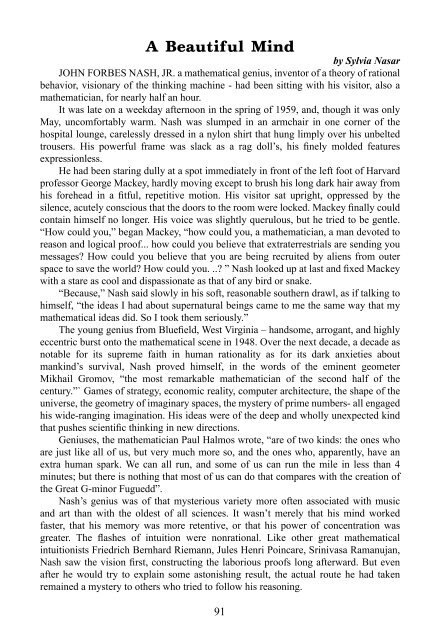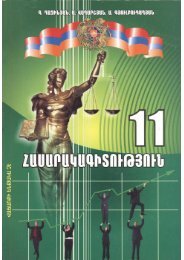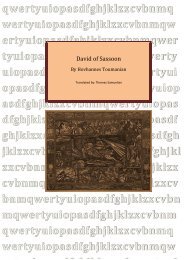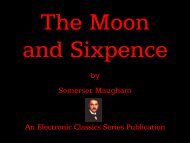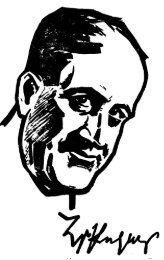Focus on Words
Focus on Words
Focus on Words
Create successful ePaper yourself
Turn your PDF publications into a flip-book with our unique Google optimized e-Paper software.
A Beautiful Mind<br />
by Sylvia Nasar<br />
JOHN FORBES NASH, JR. a mathematical genius, inventor of a theory of rati<strong>on</strong>al<br />
behavior, visi<strong>on</strong>ary of the thinking machine - had been sitting with his visitor, also a<br />
mathematician, for nearly half an hour.<br />
It was late <strong>on</strong> a weekday afterno<strong>on</strong> in the spring of 1959, and, though it was <strong>on</strong>ly<br />
May, uncomfortably warm. Nash was slumped in an armchair in <strong>on</strong>e corner of the<br />
hospital lounge, carelessly dressed in a nyl<strong>on</strong> shirt that hung limply over his unbelted<br />
trousers. His powerful frame was slack as a rag doll’s, his finely molded features<br />
expressi<strong>on</strong>less.<br />
He had been staring dully at a spot immediately in fr<strong>on</strong>t of the left foot of Harvard<br />
professor George Mackey, hardly moving except to brush his l<strong>on</strong>g dark hair away from<br />
his forehead in a fitful, repetitive moti<strong>on</strong>. His visitor sat upright, oppressed by the<br />
silence, acutely c<strong>on</strong>scious that the doors to the room were locked. Mackey finally could<br />
c<strong>on</strong>tain himself no l<strong>on</strong>ger. His voice was slightly querulous, but he tried to be gentle.<br />
“How could you,” began Mackey, “how could you, a mathematician, a man devoted to<br />
reas<strong>on</strong> and logical proof... how could you believe that extraterrestrials are sending you<br />
messages? How could you believe that you are being recruited by aliens from outer<br />
space to save the world? How could you. ..? ” Nash looked up at last and fixed Mackey<br />
with a stare as cool and dispassi<strong>on</strong>ate as that of any bird or snake.<br />
“Because,” Nash said slowly in his soft, reas<strong>on</strong>able southern drawl, as if talking to<br />
himself, “the ideas I had about supernatural beings came to me the same way that my<br />
mathematical ideas did. So I took them seriously.”<br />
The young genius from Bluefield, West Virginia – handsome, arrogant, and highly<br />
eccentric burst <strong>on</strong>to the mathematical scene in 1948. Over the next decade, a decade as<br />
notable for its supreme faith in human rati<strong>on</strong>ality as for its dark anxieties about<br />
mankind’s survival, Nash proved himself, in the words of the eminent geometer<br />
Mikhail Gromov, “the most remarkable mathematician of the sec<strong>on</strong>d half of the<br />
century.”` Games of strategy, ec<strong>on</strong>omic reality, computer architecture, the shape of the<br />
universe, the geometry of imaginary spaces, the mystery of prime numbers- all engaged<br />
his wide-ranging imaginati<strong>on</strong>. His ideas were of the deep and wholly unexpected kind<br />
that pushes scientific thinking in new directi<strong>on</strong>s.<br />
Geniuses, the mathematician Paul Halmos wrote, “are of two kinds: the <strong>on</strong>es who<br />
are just like all of us, but very much more so, and the <strong>on</strong>es who, apparently, have an<br />
extra human spark. We can all run, and some of us can run the mile in less than 4<br />
minutes; but there is nothing that most of us can do that compares with the creati<strong>on</strong> of<br />
the Great G-minor Fuguedd”.<br />
Nash’s genius was of that mysterious variety more often associated with music<br />
and art than with the oldest of all sciences. It wasn’t merely that his mind worked<br />
faster, that his memory was more retentive, or that his power of c<strong>on</strong>centrati<strong>on</strong> was<br />
greater. The flashes of intuiti<strong>on</strong> were n<strong>on</strong>rati<strong>on</strong>al. Like other great mathematical<br />
intuiti<strong>on</strong>ists Friedrich Bernhard Riemann, Jules Henri Poincare, Srinivasa Ramanujan,<br />
Nash saw the visi<strong>on</strong> first, c<strong>on</strong>structing the laborious proofs l<strong>on</strong>g afterward. But even<br />
after he would try to explain some ast<strong>on</strong>ishing result, the actual route he had taken<br />
remained a mystery to others who tried to follow his reas<strong>on</strong>ing.<br />
91


